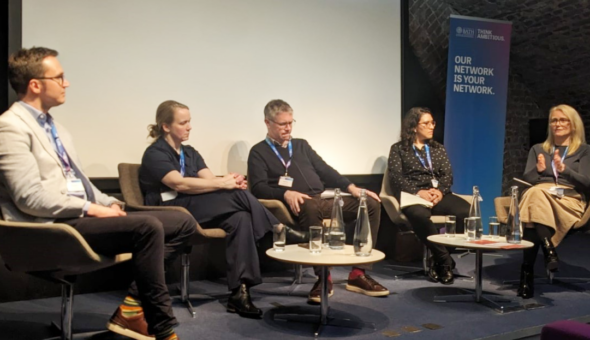To mark the month of International Women's Day, the Business and Society blog will spend March getting to know some of the School of Management's female academics! Mairi Maclean is a Professor of International Business in the School of Management at the University of Bath. We sat down with her to discuss her latest research on elite philanthropy and the Rowntree Lectures, her proudest achievements, as well as the inspiration she draws from her family.
What is your current role and can you tell me about the path that took you there?
I am Professor of International Business. I’ve previously worked at the Universities of Aston, Royal Holloway, UWE, Exeter and Newcastle, and also spent a year working at the Sorbonne in Paris. During this time, I've taken on a wide range of academic roles, including MBA Director and Deputy Dean at Royal Holloway, Research Degrees Director at UWE, Research Director at Exeter, and Director of Research at Newcastle. I am a ‘people person’ - I enjoy working with colleagues as a collaborator or mentor, and this has led me to my current role, which is Associate Dean for Faculty. I think that work is always better when it’s fun and working closely with others makes work much more meaningful for me. I was also an MBA student here at Bath many years ago, so when I joined the School, it was like ‘coming home’!
What are your research interests? Can you tell me about your recent work, or what you’re working on at the moment?
My research interests include historical organisation studies, business elites and elite power from a Bourdieusian perspective, and entrepreneurial philanthropy. I’ve been involved in establishing a new community of scholars in historical organisation studies, and it has been really satisfying to see that grow and evolve. I’ve just published a book on Historical Organisation Studies: Theory and Application (Routledge, 2021), with Stewart Clegg, Roy Suddaby and Charles Harvey, which grew out of an EGOS sub-theme we organised.
I’ve also been working on a fascinating ESRC-funded project with former colleagues at the University of Exeter on the ‘Rowntree Business Lectures and the Interwar Management Movement’. The Rowntree lectures were conceived to break through differentiated levels in the industrial hierarchy in the years following World War I. They brought together employers and employees from different organisational levels, particularly directors, managers, foremen and forewomen, to debate pressing issues of the day. The interwar years have been regarded as something of a ‘dark age’ of British management. In lieu of a period of reactionary thinking with little going on, we find strong evidence of profound efforts to improve British management practices, learning and education. We uncover dynamic knowledge networks reflexively engaged in advancing and codifying practice-based peer-to-peer learning to promote the spread of effective solutions to shared problems facing British industry. We have made our data available in a public facing website.
I've also recently had a paper published on elite philanthropy, which has just appeared in the International Journal for Management Reviews, finds that large-scale giving by the rich has so far done little to redistribute wealth from rich to poor. While some very wealthy people generously give away sizeable parts of their fortunes, the vast majority does not. Elite philanthropy functions to lock in and perpetuate inequalities rather than remedying them, because a very large part of elite philanthropy supports elite causes and elite institutions. Elite philanthropy has also increased the sway of the super wealthy in social and political affairs. Charter schools in the US and Academy Schools in the UK are illustrative. Contrary to popular belief, poor countries in the developing world are not as yet major beneficiaries of elite philanthropy, since the greater part of elite philanthropic funding stays at home. Elite philanthropists have their reputations for generosity supercharged by ordinary taxpayers. In both the US and the UK, philanthropists have their giving power boosted by being able to offset their donations against their tax bills, and actively resist attempts at reform.
What impact do you hope your work has?
My research on entrepreneurship and philanthropy with former colleagues in the Centre for Research on Entrepreneurship, Wealth and Philanthropy at Newcastle University has impacted in three significant ways: shaping the work and strategy of a sector-leading philanthropic foundation; enhancing public understanding of entrepreneurial philanthropy; and inspiring and educating philanthropists and philanthropy professionals. My work around the journey from entrepreneurship to philanthropy - whereby entrepreneurs and their families extend their impact beyond business to wider society - has produced five original insights:
- Generativity as core motivation. While personal dispositions and reward-seeking play a role in driving philanthropy, far more important is the desire to generate a socially oriented legacy for oneself.
- Role of expert advisors. Early-stage philanthropists often make mistakes and struggle to find direction. Professional advisors and role models are often key to future effectiveness.
- Social investing mindset. Entrepreneurial philanthropists are active donors who apply business principles, exercise control, and invest in carefully crafted theories of change.
- Virtuous circle of giving. The satisfactions from giving back, making a difference and working with like-minded others progressively increase commitment to philanthropy.
- Identity change and storytelling. Philanthropic identities are crafted through the practice of storytelling, which affirms and legitimises life choices, while serving to inspire others and bring them to the cause.
What are you most proud of in your career so far?
I’m proud of my research project on Business Elites and Corporate Governance in France and the UK, funded by Reed Charity and the Leverhulme Trust, which was foundational in my career. It was a large-scale project that took many years to complete, entailing the construction of an extensive database of French and British business elites, alongside numerous interviews, but the results were beyond what we could ever have hoped for. It spawned many publications and proved to be the bedrock of my work on business elites from a Bourdieusian perspective, sparking my research into entrepreneurial philanthropy. I’m proud of my AMR paper on conceptualising historical organisation studies, which has proved to be a seminal study from which a community of like-minded scholars has emerged. But most of all, I’m proud of having three kids, who inspire me all the time to be the best I can!
Who’s been your biggest influence in your career?
There have been a number of major influences in my career. First of all, my dad, Derry Maclean, who always spurred me, in the days when things were in some ways harder for women than they are now, always to try to achieve what I wanted to achieve. Second, my headmaster at Stirling High School, J. Lockhart Whiteford, who told me when I was 16 that one day I would be teaching in a university, and planted the thought in my mind. My husband, Charles Harvey, has been a massive influence on my career. We have complementary skills, and working together has been so worthwhile and enjoyable. My kids have been a huge influence on me too. My daughter Emily, a GP in Cardiff, tells me I have set her the example of working hard and having a family, and how you can do both together. My son Alex, Chief Operating Officer of a listed foreign exchange company in London, never ceases to amaze me in exhibiting such strong leadership qualities. My youngest, Rebecca, who spent much of 2020 working as a junior doctor in a busy Covid ward in Newcastle, astonishes me by how she keeps it all together while helping so many others in trying times. My family keep me grounded.
What do you like best about being an academic?
What I like most about being an academic is collaborating with others, meeting up with friends old and new at conferences, and seeing younger colleagues I’ve helped begin to blossom and do well. I try to be a role model for younger female academics, to show them that you can have a successful career and a family at the same time. When I left Exeter, I tried to leave quietly, but they held a leaving do for me. Two of my kids came along to it with me. I was so touched by what my colleagues there said about me in front of them. It’s the warmth and friendship you get from the relationships that you build over the years that matter so much. I am very much looking forward to getting out of lockdown and being able to reconnect with friends, old and new. After so long in lockdown, it’ll be priceless.
Thank you Mairi!
Respond



